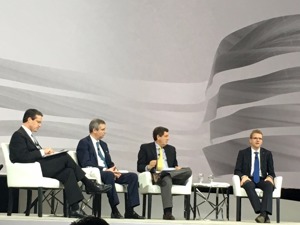ABB Customer World: Automation efficiency and the future of operational excellence
By Lee Nichols, Editor & Associate Publisher, Hydrocarbon Processing
HOUSTON -- No matter what industry you work in, improving and instituting automation efficiency can lead to operational excellence. This idea was the theme of Wednesday morning’s keynote presentation “Next level operational excellence: Efficiency in automation” at ABB Customer World 2017.

The panel-style discussion was moderated by Greg Scheu, President Americas region for ABB, and included esteemed panelists Jose Bustamante, Executive Vice President of Business Development and Strategy for Fluor, Ricardo Rizo Patron, Chairman of UNACEM Corp., and Peter Terwiesch, President of Industrial Automation Division for ABB. Each panelist provided opening remarks, followed by a question and answer session.
Mr. Bustamante began with some of the major trends he is seeing in the engineering and construction industry, and how businesses are reacting in this new market. “What we are seeing with most of our clients is the need for capital efficiency” said Bustamante, “this means making a better use of capital expenditures, and making sure that they get a return on those capital investments.”
This notion of capital efficiency is seen in large-scale industries such as oil and gas and mining, and has increased in prominence within these sectors due to the decline in commodity prices. “The first step we have to look at is the need to change how we look at projects, as well as how we execute projects. We have to use new technology, new trends, and an overall new way of doing things to improve capital efficiency for our clients.” A couple of trends Fluor has seen in this area include:
- More cooperation with clients. This provides the opportunity to discuss what are the standards, specifications, etc. that the client uses, and the ability to rethink how those practices can be more cost-efficient.
- Zero-based execution. This program includes approaching a client and discussing with them their project goals, and executing the project to meet their requirements. The following steps include things like HSE, regulatory requirements, etc. This approach can provide the client with savings of up to 30% of the project’s cost.
Other big trends Mr. Bustamants spoke about was Big Data, capturing data on existing assets, and utilizing that data for operational efficiency. This data becomes an integral part of predictive maintenance, which can save clients’ money by mitigating downtime. On the capital side, project data provides companies with the ability to effectively improve the quality and accurateness of project estimates.
Mr. Patron spoke on operational excellence from an end user’s point of view. He touched on what his company needs to do to increase operations efficiency. “We need to institute things like energy efficiency management, institute intelligent plant personnel, harness the power of the Internet of Things, remote training, etc.” said Patron, “this new technology will require skilled individuals that will need to be trained in an efficient way.” His last point touched on optimizing engineering. “We need to make the drawings work correctly; architectural, mechanical, electrical need to work together and not fight with each other. This is very important because we don’t always build a greenfield facility, sometimes it’s a brownfield, or a modification.”
Mr. Terwiesch spoke last and summed up the prior two speeches into two categories, a capital efficiency perspective and the operational perspective. “These two perspectives are tied together” said Terwiesch, “our goal is to serve in each of these phases, as well as build a bridge between the two.”
ABB provides multiple products to help on both the capital side, as well as on the operational side. These products help control schedules, monitor risks and safety, and shed costs. ABB has created the intelligent projects model, which is a next-generation model, powered through digitalization, and can increase the speed of executing oil and gas automation-based projects. The intelligent projects model encompasses intelligent engineering with intelligent infrastructure. The combination of these factors leads to a more streamlined approach to project execution, and can provide a quicker completion of the project’s schedule by 25%, reduce CAPEX/OPEX by 20%-30%, provide space savings of 60%, and reduce startup and installation hours by 40%.
Regarding operational efficiency, Mr. Terwiesch spoke about ABB’s goals for its clients. “On the operational efficiency side, our mission is to clearly help (the client) lead in productivity, energy efficiency and safety. Automation helps people do more, but also helps people stay out of harm’s way.” Mr. Terwiesch concluded his remarks by providing how automation helps operational efficiency. “There is a huge downtime exposure. Take the petrochemical industry, approximately $20 B a year is spent in unplanned downtime, and 80% of it is avoidable. We are spending our money to help save yours in this area…we use digitalization and tie this into ABB Ability™ to connect the things, services and people together to come to a new level of productivity.”







Comments